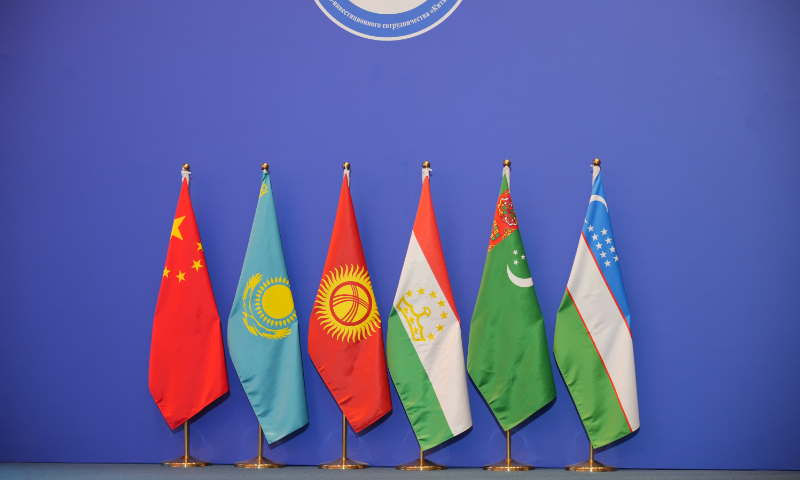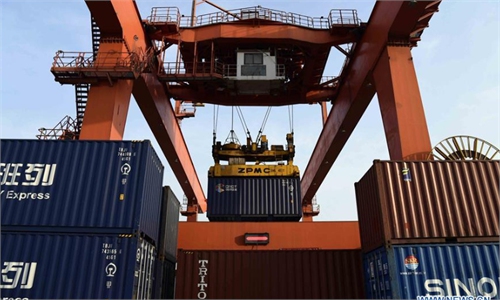First China-Central Asia Summit to convene in Xi’an to discuss substantial cooperation results and future

Photo: VCG
The first China-Central Asia Summit will be held in Xi'an, Northwest China's Shaanxi Province, in May, Chinese State Councilor and Foreign Minister Qin Gang announced on Thursday after chairing the fourth China-Central Asia (C+C5) foreign ministers' meeting in the city.
The Thursday meeting, and the upcoming leaders' summit, the highest-level interaction in the C+C5 mechanism, highlight the fact that China and Central Asian countries share great common interests on security and prosperity amid regional and global turbulence, and that regional cooperation is becoming increasingly profound and comprehensive, analysts said.
According to a press release after the meeting, the six countries coordinated on preparations for the upcoming summit and discussed the content of the outcome document.
All parties reiterated that they respect each country's right to choose the path suited to its conditions, and expressed support for each other on topics concerning sovereignty, independence, security and territorial integrity, and opposition to external interference.
According to the press release, all parties fully affirmed the achievements in the joint construction of the Belt and Road Initiative (BRI) over the past 10 years, and decided to continue under the principles of "extensive consultation, joint contribution and shared benefits" and "mutual benefit and win-win," to strive to achieve more substantive results.
Connectivity is a priority of cooperation between China and Central Asian countries, and all parties will build a multi-level and comprehensive system integrating highways, railways, aviation, and border ports, so as to provide more convenient conditions for the exchanges of personnel and the circulation of goods.
The six countries agreed to expand cooperation in agriculture, new energy, e-commerce, green and digital economy, and high technology, and create new highlights and new growth points for cooperation.
Before the FMs' meeting, Qin met with Kazakhstan's Deputy Prime Minister and Minister of Foreign Affairs Murat Nurtleu, Kyrgyzstan's Minister of Foreign Affairs Kulubaev Zheenbek Moldokanovich, Tajikistan's Minister of Foreign Affairs Sirojiddin Muhriddin, Turkmenistan's First Deputy Minister of Foreign Affairs Vepa Hajiyev, and Uzbekistan's Minister of Foreign Affairs Bakhtiyor Saidov separately on Wednesday.
Wang Xiaoquan, an expert from the Institute of Russian, East European and Central Asian Studies at the Chinese Academy of Social Sciences, told the Global Times that the China-proposed Global Development Initiative, Global Security Initiative, and Global Civilization Initiative could be discussed further in the upcoming summit within the C+C5 mechanism and provide guidance for future cooperation, including the construction of a more stable security order and a fairer economic order.
China and the five Central Asian countries share great common interests and needs in terms of maintaining regional security and stability, and related cooperation is becoming deeper and wider, analysts noted.
Wang said that Central Asia is important for China in terms of transportation, energy supply and strategic security, and is also the place where the Silk Road Economic Belt was proposed a decade ago.
China has signed cooperation documents on the BRI with all five Central Asian countries.
The geopolitical situation around Central Asia has witnessed major changes in the past few years, including the US' withdrawal from Afghanistan, the Russia-Ukraine conflict, and the chronic infiltration of terrorist elements.
Central Asian countries face reduced external interference after the US' withdrawal and have increasingly recognized the importance of a pluralist and balanced foreign policy, Zhu Yongbiao, director of the Center for Afghanistan Studies at Lanzhou University, told the Global Times.
China's neutral stance on hot-button issues, including Middle East affairs and the Russia-Ukraine conflict, has convinced Central Asia to take advantage of peaceful development, Zhu said, noting that the two sides have strong cooperation impetus in energy, disaster reduction and infrastructure.
With enhanced mutual trust and expanded common ground, concrete and substantial China-Central Asia cooperation is underway, experts said, citing projects such as the China-Kyrgyzstan-Uzbekistan (CKU) railway and the China-Central Asia gas pipeline.
In 2022, C5 trade with China amounted to $70.2 billion, up more than 40 percent year-on-year. China is the largest trading partner of Uzbekistan, Kyrgyzstan and Turkmenistan, the second largest for Kazakhstan and third largest for Tajikistan, according to official data.
Wang Xiaoquan noted that close China-Central Asia cooperation at various levels in extensive fields will rule out certain hegemonic force's efforts to fabricate a "China threat" theory or sow discord.

